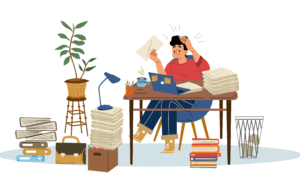
The Mess They Left? Getting Our Affairs in Order
An article in the New York Times in 2009 cited the fact that when we think of Estate Planning, we often overlook the need to get our affairs in order in an organized manner. Surprisingly in 2023 with all of the resources available to us online and offline, 54% of Canadians do not have a Will. Which creates quite a mess for your family when you die…or if you become incapacitated.
When you die, surviving family members will have to figure out what you own, what you owe, and what you want to be done with your property, investments, and digital assets. If you become incapacitated, an Executor will need to manage your financial affairs. In the world of electronic records, dying without documenting your digital assets can mean access to your personal records can be a real challenge.
Here’s a list of information someone will need to manage your affairs on your behalf. Sit down, talk with your spouse or Executor, and a lawyer to document your wishes. Explain where you keep your facts and files and how to access them.
- What legal documents you have prepared (Wills and Powers of Attorney), where the original is, and who has copies?
- Whether you are or have been appointed to act on behalf of someone else as a guardian, conservator, executor, custodian, or trustee.
- Ownership documents: Real estate deeds, vehicle registration forms, bank accounts, brokerage accounts, life insurance policies, cemetery deeds, and business contracts.
- Beneficiary forms: Retirement accounts, life insurance policies, payable upon death bank accounts, transfer on death brokerage accounts, inherited retirement accounts, transfer on death beneficiary deeds or transfer on death vehicle registration forms.
- Your tax returns for the past 5-7 years.
- User IDs and passwords. Members of your family or employees at work may need to access electronic records on the web or stored on a local personal computer.
- Who will be responsible for the daily care of a minor child? How will the money be left on their behalf and how it is to be managed?
- Pets. Who will take care of your pets if something happens to you?
- Advisers. A list of advisers in your support system to call if help is needed: lawyers, accountants, doctors, handymen, gardeners, babysitters etc.
- Income sources. List any income you may be receiving. Salary. Retirement income. Royalties. Rental income. Identify if the income is received in the mail, or automatically debited to a checking, or savings account.
- Expenses. Make a list of the bills you pay each month. Utilities. Insurance. House or rent payments. Credit cards. Identify whether they are paid by mail or in some type of electronic method. Your survivors will need account numbers and access to keep paying these accounts should you have a property to sell, getting in arrears can be costly and challenging to reverse.
- Medical records. Where they are, who is your doctor(s), and identify what types of medical insurance are available to pay for any outstanding medical bills.
Once you have collected much of this essential information the next question will be the decision on whether a lawyer can help in the Estate plan’s execution.
Whether or not you need to hire a lawyer in Ontario if someone has died will depend on the circumstances surrounding the death and the specific legal issues that may arise. Generally speaking, if the deceased person had a Will, it may be advisable to hire a lawyer to assist with the administration of the Estate.
In Ontario, the process of administering an Estate involves several steps, including:
- Applying for a Certificate of Appointment of Estate Trustee (also known as Probate)
- Identifying and gathering the deceased person’s assets and liabilities
- Paying any outstanding debts and taxes
- Distributing the remaining assets to the beneficiaries named in the Will (if there is one) or to the deceased person’s next of kin (if there is no Will)
An experienced lawyer can help you navigate this process and ensure that you comply with all applicable legal requirements.
If the deceased person did not have a Will, there may still be legal issues to address, such as determining who is entitled to inherit the Estate under Ontario’s intestacy laws. In this case, it may also be advisable to hire a lawyer to assist with the Estate administration.
Overall, while it is not always necessary to hire a lawyer in Ontario if someone has died, doing so can be beneficial in ensuring that the deceased person’s wishes are carried out and that any legal issues are handled properly. It can also help in reducing the stress between family members. The closing out of an Estate can take well over a year with a Will and people feel uncomfortable asking questions as it seems indelicate, yet for many of us this process is not a common experience and every case is different so it is understandable that many of us do not know what the steps are and that they may time to unravel especially without well-defined access to documents and a Will or Estate Plan.
To help you organize, consider our SmartAccess Kit
Want more information?
Are you interested in a consultation with Peter R. Welsh?
Contact me at Peter@SmartWills.ca
By telephone 416-526-3121
Register for our blog to get valuable tips and up-to-date alerts.
This material is for general information and educational purposes only. Information is based on data gathered from what we believe are reliable sources. It is not guaranteed as to accuracy, does not purport to be complete and is not intended to be used as a primary basis for investment decisions.


